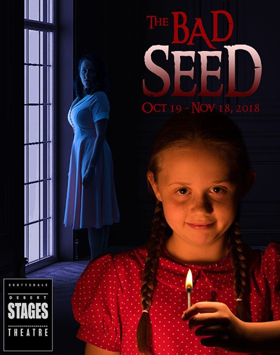Review: Desert Stages Theatre Presents THE BAD SEED

The 1950's were a wellspring of writings that built on the theories of Sigmund Freud ~ a flourishing fascination with the dysfunctional workings of the mind. Psychosis, neurosis, multiple personality disorder, and so it went. Eric Erickson was writing at the turn of the decade about the stages of psychosocial development in children and identity crises. The first edition of Diagnostic and Statistical Manual of Mental Disorders had been published in 1952, including for the first time, mention of "sociopathic personality disturbance."
It is not surprising that this fixation would become grist for the literature and theatre mill. Psycho was published in 1959 (Alfred Hitchcock's film adaptation later in 1960). Nunnally Johnson's The Three Faces of Eve, in 1957.
And, when it came to the profile of a sociopath, what could have been more unsettling than William March's 1954 novel The Bad Seed and its stage adaptation by Maxwell Anderson (followed in short order by Mervyn LeRoy's blockbuster film).
What makes THE BAD SEED a particularly terrifying and disconcerting story is that the sociopath is Rhoda Penmark, a pigtailed eight-year-old basket of kisses who confounds most everyone with her solicitous and ingratiating behavior, all the while covering up her dastardly deed ~ the murder of a fellow student all for the want of a medal she thought she was entitled to.
In Desert Stages Theatre's current production of the play, directed by Diane Senffner, ten-year-old Anora Biggs epitomizes the dark side of this child with a glare and a smile that is downright chilling.
Her performance is not enough, however, to sustain what should be a taut and suspenseful escalation to revelation and resolution. The juice is squeezed out of the tension by a pacing that feels plodding, performances that are mixed and unsteady, and a set so cramped that it inhibits effective blocking.
So much love abounds around Rhoda that one might reasonably wonder how such a sweetheart might actually possess the seeds of a demon. There's the protective and dutiful mother (Virginia Olivieri); the doting dad (Mike Halpin), an Air Force Colonel, off to assignment in D.C.; Monica Breedlove (Janis Webb), the garrulous upstairs neighbor, who lives up to her name with an excessive fondness for the child.
All are unsuspecting foils in Rhoda's web of deceits and dissimulation.
One character, however, the building's maintenance man, Leroy (played with demonic flair by Robert Peters), sees through Rhoda's caprices, and it just burns him up. It's rather fun to watch the uncannily all-knowing Leroy contend with the fierce denials of wily young Rhoda.
It would not be fair to either the performers or the audience to reveal the inner secrets and twists of THE BAD SEED, save to say that Anderson's construction of the drama signals plenty of hints as to what's up and what will be. The problem is that the building blocks he sequenced for potentially riveting aha moments just don't fit together as well and as tightly as they should.
THE BAD SEED continues to sprout through November 18th in the Actors Café at Desert Stages Theatre in Scottsdale.
Photo/poster credit to Wade Moran
Reader Reviews

Videos
